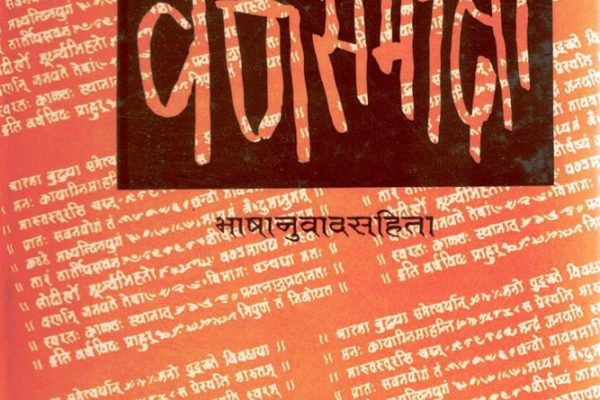May 29, 2021 Sadasadavada is one of the several books authored by renowned Vedic teacher PanditMadhusudan Ojha on Creation. In this book, Ojhaji has presented 21 philosophical issues.Although in essence there are only seven basic philosophical issues–pratyaya, prakriti,tadamya, arya, guna, samanjasya and akshara, but with the presence of sat (truth),asat (what is not truth) and satsat, in each of these make the total to 21. Here, pratyaya refers to jnana or knowledge. This knowledge is explained with the help of three elements–drishta or seeker, jnana or knowledge and drishya or what is knowable. The book also explains sat in its three states–wakefulness, dream and deep sleep. Ojhaji has then expanded on seven states of atma–wakefulness, dream, deep sleep, hypnotic, coma, death and salvation. On May 29, 2021, Shri Shankar Shikshayatan organised a National Webinar onSadasadavada as part of its discussion series to highlight various works of three gurus,Pandit Madhusudan Ojha, Pandit Motilal Shastri and Rishi Kumar Mishra. The Googlemeet was chaired by Prof Satya Prakash Dubey, former Director, PanditMadhusudan Ojha Shodh Prakosht, Jainarain Vyas University, Jodhpur, Rajasthan. Keyspeakers included Prof. Gopal Prasad Verma and Prof Prabhakar Prasadof Lal BahadurShastri Rashtriya Sanskrit University, New Delhi, Dr KTV Raghavan, Indira GandhiNational Centre for Arts (Puducherry), Dr Bhavnath Jha, Mahavir Mandir, Patna, Bihar andProf. Santosh Kumar Shukla of Jawaharlal Nehru University as well as Convener, ShriShankar Shikshayatan. Prof. Gopal Prasad Sharma said Ojhaji in this book has examined philosophical principles.He pointed out Ojhaji in his other books, Dashavadarahasya, Maharshikulavaibhavam,vyomavada and Pandit Motilal Shastri in his Vyakhyan-panchakam have given a detailedaccount of sat, asat and sat-asat. Ojhaji has referred to Taitteriya Upanishad for hisexplanations on sat. He has used Brahma as the focal point of reference.Asanneva sa bhavati asadabrahmoti veda chetAsti brahmoti chedveda santamenam tato vidu.–Taitteriya Upanishad 2.6’ Prof. Prabhakar Prasad said in Sadasadavada, Ojhaji has explained the process ofCreation through the prism of sankhya, vaisheshik and vedanta schools of philosophy. Hehas clarified the meaning of karan or cause and karya or effect. The creation is karya andits catalyst tattva is Brahma. According to vaisheshik and vedanta school, mud is thecause and pot is the effect or result. The form of pot is asat but its existence rests on mud.Ojhaji has termed pot as bala and karma. Mud is also bala and in this bala manifest thepot. The same pot, which is asat, becomes sat after some time. Yatasti mritsa na ghatosti tasyam asan ghatastatra dadhati sattamGhato balam karma cha mridbalastham sattamupadaya vibhati tavatYatkaryamutpadhyat aitadasid asata pura sabhdavatih pashchatVaishikairesha nirupitortho naiyayikaishchabhimatoyamarth.–Sadasadavada, p. 35, karika 4 Dr Raghavan said the book offered an explanation of drishta, drishya and vaka. Drishta isthe one who sees or seeks and drishya is the object; these are two separate entities in theworld. Drishta is internal and drishya is what is visible.In philosophical terms, drishta iscalled pramata or vishayi. Ojhaji termed drishta as sat and drishya as asat. Pashyami vishvam mama darshanesmin drishta cha drishyam cha prithaka vibhatiDrishtanarah kaschidabhinna eko drishyani bhuyamsi bahia sthithaniDrishta pramata vishayi sadartho gyata cha brahmaneti na bhidhyaterthahDrishyam prameyam vishayosadartho gyeyam cha karmethi na bhidhyaterthah.–Sadasadavada p. 1 karika 2-3 Dr Bhavnath Jha, in his speech, referred to Ojhaji’s use of Buddhist principles in his book.He mentioned aryachatushtaya and panchaskanda. He said worldly sorrows are fleeting.This Buddhist concept is explained by Ojhaji in his book. Prof. Satyaprakash Dubey said, Ojajhi, through his various books, had given a deepinsight into the mysteries of creation. His disciple, Pandit Motilal Shastri has, in his ownbooks, presented twelve vadas or reasonings for creation. Sadasadavada is a uniquebook explaining the meaning of sat, asat and sat-sat in the context of creation of theuniverse. Rounding up the discussion, Prof. Santosh Kumar Shukla said Sadasadavada wasdivided into seven chapters, each dealing with different subjects. These subjectsare–pratyaya, prakriti (nature), ekatmaya (uniform), karya (action), guna (quality),samanjasya (relationship) and akshara. These seven subjects are examined on sat, asatand sat-asat principles which makes them 21 subjects in all. Pratyaya evam prakritishchaikatamayam chabhikarya chaSvagunaha samanjasya chakshar eti saptadha vimarsha syuhaPratyekameshu santi trayo vikalpa asachha sat sadsatTenayam ekavimshi sadasadvado nirupyote samyak.–Sadasadavada, p. 1, karika 1-2 Prof. Shukla pointed out that Ojhaji, quoting Shatapatha Brahamana, made the subjecteasier and said prana was asat, vak was sat and mana was sat-asat. The programme was conducted and coordinated by Dr Lakshmi Kant Vimal and Dr ManiShankar Dwivedi of the Shikshayatan, in association with Dr Bishnu Shankar Mahapatra.The meeting was attended by teachers, scholars and students from different universitiesand educational institutions

